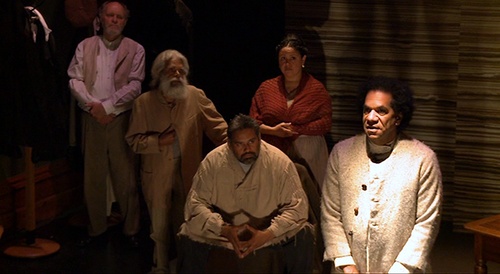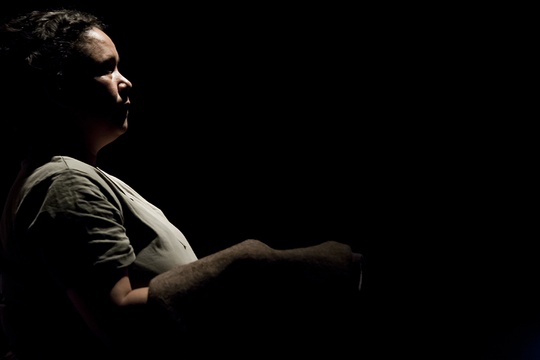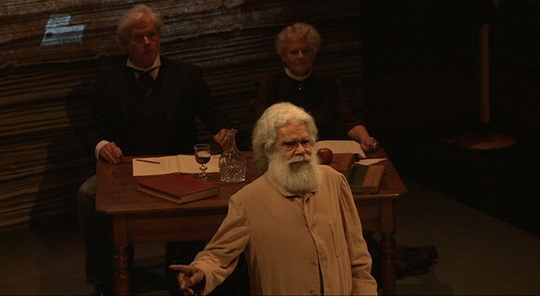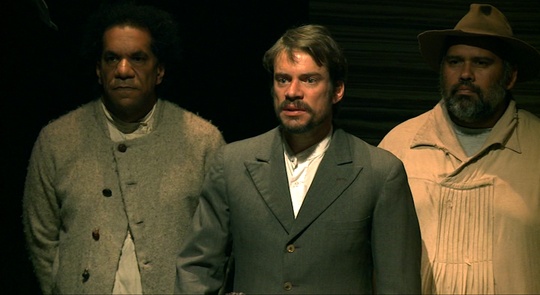The Minutes of Evidence project sheds light on a little-known chapter of Victoria's past, the 1881 Parliamentary Inquiry into the Aboriginal Reserve at Coranderrk, in order to spark public conversations about history and structural justice, and to raise awareness about the importance of collaboration between Indigenous and non-Indigenous people to promote a just and shared future. The project creates 'meeting points' in schools, on Country, in theatres and between scholars, so that the nation's past — and present — can be explored, shared and interrogated in new and engaging ways.
About the Project
The Minutes of Evidence project is funded by an Australian Research Council (ARC) Linkage grant, with substantial support from thirteen Partner Organisations. It is a unique collaboration between researchers, education experts, performance artists and community and government agencies that seeks to promote greater awareness of the effects of settler colonialism and a more open consideration of how to live together justly in the future. Through a bold, multi-disciplinary approach that brings together research, education and performance, the Minutes of Evidence project highlights the local and broader significance of the 1881 Parliamentary Coranderrk Inquiry by examining how notions of justice have been formulated, invoked and confronted over time and space, and how the enduring legacies of past injustices continue into the present - despite official responses designed to redress them - so as to foster new ways of thinking about structural justice in the present and future.
This is my evidence.
Caroline Morgan,
minutes of evidence,
1881 Parliamentary Coranderrk Inquiry.
The Minutes of Evidence project has supported the Department of Education and Early Childhood Development’s production of an innovative and collaborative curriculum in History and Civics & Citizenship for Victorian secondary schools. In association with ILBIJERRI Theatre Company and La Mama, The Minutes of Evidence project has also presented a groundbreaking verbatim-theatre play Coranderrk: We Will Show The Country, which brings to life the voices of Indigenous and European people who testified at the 1881 Parliamentary Coranderrk Inquiry. The project also supports research training for early-career Indigenous scholars and is co-authoring a book, Keeping hold of justice: the experience of law in the colonial past, present and future.
The project responds to two key recommendations of the 1991 Royal Commission into Aboriginal Deaths in Custody and the 1997 Bringing Them Home Reports:
- The need to educate the broader population about Aboriginal history;
- The need to redress the full range of entrenched disadvantages [‘structural injustices’] arising from that history if widespread and long-term change is to take place [which we call ‘structural justice’ in the project].
Read more about the project and how it began.
Outcomes
The Minutes of Evidence project has worked towards creating an ongoing legacy of the project through the following four key outcomes:
Research, research training and publications: about structural justice and injustice; how understanding the relationship between the colonial past and the present can inform just futures; research training for early-career Indigenous scholars.
Education: through the prism of the 1881 Parliamentary Coranderrk Inquiry, the development of curriculum and teaching resources for secondary schools, and advisory protocols for implementing the curriculum.
Performances: a verbatim-theatre re-enactment of the 1881 Parliamentary Coranderrk Inquiry that brings its key justice themes before a broad audience.
A model of Indigenous and non-Indigenous collaboration and public Engagement.
Research
The Minutes of Evidence project focuses on extending public and scholarly understanding of structural justice and of structural injustice. Together, through interdisciplinary research and dialogue, historians, socio-legal and legal theorists, criminologists and cultural geographers are engaging with the problem of structural injustice – interrogating its historical and contemporary bases, exploring modes of recognition and redress, and considering the possibility of a structural justice. Researchers on the project are connecting episodes of injustice and justice across time and space in order to consider how notions of justice have been formulated, invoked and confronted, and how and why the enduring legacies of past injustices continue. The project is interested in how understanding the experiences of the past can help us make sense of the present, and pave the way to a just and shared future. Read more about Structural Justice and the project's research outcomes.
Leave us here, give us this ground and let us manage [Coranderrk] and get all the money.
Why do not the people do it themselves?
William Barak
minutes of evidence,
1881 Parliamentary Coranderrk Inquiry.
Research Training
The project incorporates postgraduate research training through Early Career Indigenous Researcher Awards (ECIRA). These Awards support students who already have a good undergraduate or Honours degree in an area of interest to the project and who are keen to advance their research experience and career opportunities by completing an individually designed research project, such as undertaking field and/or archival research that is written up for publication. Each ECIRA project draws on and extends the student’s existing knowledge and skills, is overseen by an academic advisor and mentor, and makes an important contribution to the aims and outcomes of the project as a whole. Read more about the ECIRA projects currently underway.
Education
The Minutes of Evidence project is producing curriculum modules and teaching resources that will help teachers to raise students' awareness of Victoria's history and the 1881 Parliamentary Coranderrk Inquiry in particular. New curriculum resources for secondary students are being developed, in consultation and engagement with Indigenous and non-Indigenous stakeholders, as are advisory protocols for teaching this curriculum. A version of the play has been developed for school audiences in order to provide further information about the history of Coranderrk, and to elaborate on the themes of justice and injustice raised by the 1881 Inquiry. A book is now also available: containing the script of the play, Coranderrk: We Will Show The Country, and a history of the 1881 Parliamentary Coranderrk Inquiry, it is designed to assist teachers, students, researchers and theatre audiences to gain greater insight into the history of Coranderrk and the 1881 Inquiry. Read more about Educational and Curriculum resources.
Performance
 The script of Coranderrk: We Will Show The Country consists of extracts containing the testimonies of Indigenous and settler peoples from the official minutes of evidence of the 1881 Victorian Parliamentary Inquiry into the Coranderrk Aboriginal Station, together with letters, petitions and newspaper articles from the time of the Inquiry. Through the medium of 'verbatim-theatre', it brings back to life the voices of the past so that they can speak to a contemporary audience, and thereby helps to educate a wider audience about Victoria’s history and the experiences of Aboriginal people in 19th-century Victoria. The play illustrates the concepts of structural injustice and structural justice; it demonstrates the importance of collaboration on matters of justice, how past collaboration can inform present collaboration; and it brings together the power of oral history and the written word - conventionally regarded as distinct traditions of knowledge about the past. Coranderrk: We Will Show The Country has been publicly performed several times to over 4,000 people, eliciting powerful and positive responses both from descendants of Coranderrk as well as the broader community. Read more about the play, Coranderrk: We Will Show The Country.
The script of Coranderrk: We Will Show The Country consists of extracts containing the testimonies of Indigenous and settler peoples from the official minutes of evidence of the 1881 Victorian Parliamentary Inquiry into the Coranderrk Aboriginal Station, together with letters, petitions and newspaper articles from the time of the Inquiry. Through the medium of 'verbatim-theatre', it brings back to life the voices of the past so that they can speak to a contemporary audience, and thereby helps to educate a wider audience about Victoria’s history and the experiences of Aboriginal people in 19th-century Victoria. The play illustrates the concepts of structural injustice and structural justice; it demonstrates the importance of collaboration on matters of justice, how past collaboration can inform present collaboration; and it brings together the power of oral history and the written word - conventionally regarded as distinct traditions of knowledge about the past. Coranderrk: We Will Show The Country has been publicly performed several times to over 4,000 people, eliciting powerful and positive responses both from descendants of Coranderrk as well as the broader community. Read more about the play, Coranderrk: We Will Show The Country.
Engagement
Since 2009, when it was conceptualized collaboratively, the Minutes of Evidence project has engaged broadly with stakeholders in order to achieve its stated outcomes. As an overarching aspect of all project activities, engagement has taken the form of:
- Indigenous perspectives and involvement at every stage of the project's development
- Consultation with local Indigenous community members around the presentation of the play, including special performances for the benefit of descendants of Coranderrk
- Public and school-based performances of the play
- Development of curriculum and resources for Victorian secondary schools
- A project website and a public seminar in Melbourne
- Ongoing consultation with stakeholders at all stages of development
Read more about the project's Engagement outcomes.
Do you consider full blacks are as intelligent as the half-castes?
— Undoubtedly
Mixing the blood does not improve the intelligence?
— No.
John Green
minutes of evidence,
1881 Parliamentary Coranderrk Inquiry.
Achievements
Major achievements and timeline of the Minutes of Evidence project:
2009
- Julie Evans and Giordano Nanni discussed the idea of re-staging the 1881 Parliamentary Coranderrk Inquiry through the medium of verbatim theatre.
- During a pilgrimage to Coranderrk, Giordano Nanni and Aunty Joy Murphy Wandin, Senior Wurundjeri Elder, met and spoke about the prospect of re-staging the 1881 Parliamentary Coranderrk Inquiry.
- The Faculty of Arts at the University of Melbourne provided seed funding for the development of the project.
- MoE project commenced conversations around the staging of the play with key stakeholders and future partners, La Mama Theatre, ILBIJERRI Theatre Company and the Department of Education and Early Childhood Development (DEECD).
2010
- MoE project partners, together with Yorta Yorta playwright Andrea James, held a workshop with 9 actors which culminated in 4 pilot readings of a draft script entitled, Coranderrk: We Will Show The Country. These public readings were held at the La Mama Courthouse Theatre, Melbourne.
- Partner Investigators Rachael Maza (ILBIJERRI) and Jennifer Bates (Koorie Heritage Trust) initate consultation and engagement with local Indigenous community members in Melbourne and Healesville.
- Following extensive discussions and consultations with partners, an application for funding was lodged with the Australian Research Council.
2011
- Ongoing consultation and engagement with local Indigenous community members in Healesville and Melbourne, including the Wurundjeri Land Council.
- 3 rehearsed readings of Coranderrk: We Will Show The Country were staged at the University of Melbourne (Melba Hall) and at Coranderrk in Healesville (Sanctuary House), two for local community and descendants of Coranderrk.
- The MoE project was awarded an ARC Linkage Grant. Contracts between partners were signed and the management structure of the project was assembled.
- A sold-out full premiere season of Coranderrk: We Will Show The Country was staged at the La Mama Courthouse Theatre (14 performances in total), with Q&A sessions with cast and researchers.
- A DVD of the play was produced for archival purposes.
2012
- MoE project researchers and partners presented papers at the Historical Justice & Memory Conference (Swinburne University) and the Symposium on Settler Colonial Governance (Postcolonial Institute, Melbourne).
- ILBIJERRI staged two performances of Coranderrk: We Will Show The Country at BMW Edge, Federation Square as part of the City of Melbourne's inaugural Indigenous Arts Festival, followed by a Q&A with the cast and MoE project members.
- The temporary MoE project website went live.
- ILBIJERRI staged 4 performances of Coranderrk: We Will Show The Country at the Sydney Opera House (Playhouse Theatre), followed by a Q&A with MoE project members.
- MoE project researchers and partners presented an invited keynote address at the Historical Teachers Association of Victoria annual conference, informing Victorian teachers about the work of the project. Excerpts of the verbatim play were performed live by cast members Liz Jones and Melodie Reynolds-Diarra.
- MoE project researchers initiated publications.
- Aboriginal Studies Press contracted Giordano Nanni and Andrea James to publish a book, Coranderrk - We Will Show The Country, featuring the annotated version of the verbatim script.
- Consultation and engagement meetings with Healesville community members in preparation for a new series of performances of the play in Healesville.
2013
- Early Career Indigenous Researchers were appointed to the project.
- Ongoing consultation and engagement with local Indigenous community members in Healesville and Melbourne, including the Wurundjeri Land Council.
- MoE project researchers travelled to Brighton UK to present papers at a research workshop at the University of Sussex.
- The State Library of Victoria digitised the minutes of evidence of the 1881 Parliamentary Coranderrk Inquiry.
- The MoE Project initiated the development of an education version of the play. ILBIJERRI produced a pilot that it later developed as a separate ILBIJERRI production called CORANDERRK.
- Ongoing consultation and engagement with local Indigenous community members and descendants of Coranderrk.
- A series of workshops was conducted with students from Healesville High School as part of the process of community engagement around the re-developed play. A video was produced by ILBIJERRI from these workshops.
- The Department of Education audited current resources for teacher support in the lead up to commissioning of curriculum materials relating to the 1881 Parliamentary Coranderrk Inquiry.
- 3 readings of the new play CORANDERRK were performed in Healesville (Memorial Hall) and at the University of Melbourne (Open Stage).
- The Department of Education awarded a tender for writing curriculum materials to Social Education Victoria.
- Three trial schools were selected for testing the new curriculum resources: Worawa Aboriginal College, Healesville High School and Melbourne Girls' College.
- An induction day was held at Worawa Aboriginal College for Social Education Victoria and teachers from the trial schools.
- Aboriginal Studies Press published the book Coranderrk - We Will Show The Country, featuring the annotated verbatim script of the play and a history of the 1881 Parliamentary Coranderrk Inquiry.
- Museum Victoria (Bunjilaka) launched its First Peoples exhibition, which features filmed excerpts from the play, Coranderrk: We Will Show The Country and interviews with cast and creatives. The exhibition will run for 10 years.
- A trust fund was established for the maintenance of the Coranderrk cemetery, administered by descendants of Coranderrk, into which a portion of box-office earnings and royalties from the play will be directed.
2014
- The MoE project website was launched.
- Completions of books and articles in progress.
- A public symposium on structural justice - Just Encounters: Bringing Together Arts, Education and Research - was held at the State Library of Victoria, on 15 August 2014.
2015
- CI Associate Professor Julie Evans and MoE Early Career Indigenous Researcher Lilly Brown were invited to speak at an international conference called Colonial Christian Missions and their Legacies, University of Copenhagen (27-29 April 2015).
- In August/September, La Mama presented another sold out three week season of the original verbatim production Coranderrk: We Will Show the Country at the Carlton Courthouse with many performances followed by Q & A sessions
- Members of the Minutes of Evidence Project research team presented a panel discussion and Q & A about staging the production of Coranderrk: We Will Show the Country at a free public event at Parliament House, Canberra (28 June 2015).
- La Mama toured the production of Coranderrk: We Will Show the Country to great acclaim at schools and community centres in metropolitan and regional Victoria
- La Mama and Social Education Victoria (SEV) produced a film version of each scene of Coranderrk: We Will Show the Country for teachers and students to use through the FUSE education network.
- Ongoing publications of research outputs.
- CIs Jennifer Balint, Julie Evans, Mark McMillan and Nesam McMillan hosted a workshop in July at the International Institute for the Sociology of Law: ''Moving On'? Official responses to mass harm and the question of justice'.
Partners
Creative Victoria
Deakin University
The Department of Education and Training (Victoria)
ILBIJERRI Theatre Company
The Koorie Heritage Trust
La Mama Theatre
Regional Arts Victoria
Royal Holloway University of London
The State Library of Victoria
The University of Melbourne
The University of Sussex
The Victoria Health Promotion Foundation (VicHealth)
Victorian Aboriginal Education Association Inc (VAEAI)
Chief Investigators and researchers
Partner Investigators
Contact Us
To contact the Minutes of Evidence project, email info@minutesofevidence.com.au
or send a message via our Contact form.


